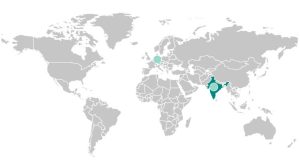In recent years, Germany has developed into an attractive destination for doctors from non-EU countries. The lucrative career opportunities and prospects that the country offers have prompted many medical professionals to continue their professional careers here. In this article, we will take a closer look at the benefits of a medical career in Germany for non-European doctors and explore how they can get off to a successful start in this country. We will also discuss the support and guidance available to these physicians.
GloberiaGlobal is a respected international recruitment agency specializing in facilitating the recruitment process for non-European doctors and healthcare employers in Germany. Recognizing the unique challenges and complexities of international medical professionals seeking opportunities in the German healthcare system, GloberiaGlobal acts as a bridge connecting talented physicians with potential employers.
For healthcare employers in Germany, GloberiaGlobal is a trusted partner in finding qualified and experienced international doctors, simplifying the hiring process and contributing to the diversity and competence of the healthcare workforce. With a commitment to excellence and a comprehensive understanding of the unique needs of applicants and employers, GloberiaGlobal plays a central role in promoting international collaboration in the dynamic healthcare sector in Germany.
1. Why Germany is attractive for doctors from non-EU countries: career opportunities and prospects
Germany offers doctors from non-EU countries a wide range of career opportunities and perspectives. Here are some reasons why Germany should be interesting for foreign doctors:
- High demand: Germany has a growing need for doctors, particularly in rural areas and in certain specialties such as general medicine, neurology and psychiatry.
- Good pay: Doctors in Germany earn a higher salary compared to many other countries. This enables a higher quality of life and financial stability.
- Working conditions: Germany offers doctors good working conditions, including reasonable working hours, paid vacation and a good work-life balance.
- Research opportunities: Germany is known for its highly developed medical research. Non-EU doctors have the opportunity to take part in groundbreaking research projects and expand their knowledge.
2. The advantages of a medical career in Germany for non-European doctors
A medical career in Germany offers non-European doctors a number of advantages and opportunities. Here are some of the most important ones:
- International recognition : Medical training and experience in Germany is highly regarded and recognized internationally.
- Specialization options : Germany offers a wide range of specialization options in various medical fields.
- Intercultural experience : By working in an intercultural environment in Germany, non-European doctors can gain valuable intercultural experience and improve their communication skills.
- Quality of life : Germany offers a high quality of life with first-class education and healthcare systems, a high level of cultural diversity and a well-developed infrastructure.
3. How to get started as a non-EU doctor in Germany: requirements and options
In order to get started as a non-EU doctor in Germany, certain requirements must be met. Here are some steps and ways to make the process easier:
- Recognition of qualifications : The medical qualifications must be recognized by the responsible authority in Germany.
- Translation : It is necessary to submit all your certificates in German through an approved translation.
- Knowledge of German : Excellent knowledge of German is a prerequisite to be able to work as a “doctor” in Germany. A language certificate with a C1 level in the German language is often required.
- Job offers and job placement : Non-EU doctors can search for job offers in German hospitals using job exchanges, recruitment agencies or direct applications. GloberiaGlobal is an international doctor placement agency based in Magdeburg, Germany .
- Visa application : In order to submit your visa application, it is necessary to attend an appointment and submit all required documents in full in your home country. These documents should contain all relevant information and documents in accordance with the requirements of the visa application.
- Specialist language test : Due to the regulation of the medical professions in Germany, in order to obtain a license to practice medicine, it may be necessary to successfully pass the specialist language test, which tests both oral and written knowledge of German medical terminology. Some language schools offer special courses to prepare for this exam.
- Support from professional associations and networks : There are various professional associations and networks that can help non-European doctors with integration and career planning in Germany.
4. Support and guidance for non-European doctors who want to work in Germany
There are various organizations and contact points to support non-European doctors in their careers in Germany. Here are some of the most important ones:
| organization | Services |
|---|---|
| Medical Association | – Advice and support in the recognition of medical qualifications. – Information about further training and specialization opportunities. |
| Federal Employment Agency | – Arrangement of job offers and job placement. – Support in the preparation of application documents. |
| GloberiaGlobal – An international recruitment agency | – Collaborate with candidates, providing support throughout the entire recruitment process, from the first steps to interviews and final placement, all without any fees. – Work with healthcare employers and assist in finding and selecting the right candidates for their needs. |
Summary: Germany offers non-European doctors a variety of career opportunities and perspectives. In addition to high demand and good working conditions, a medical career in Germany is characterized by international recognition, specialization opportunities and a high quality of life. In order to get off to a successful start in Germany, non-European doctors must have their qualifications recognized, demonstrate good knowledge of German and look for job offers seek. They receive support and orientation from organizations such as the Medical Association, the Federal Employment Agency and integration courses. With the right conditions and the right support, non-European doctors can build a fulfilling career in Germany.



